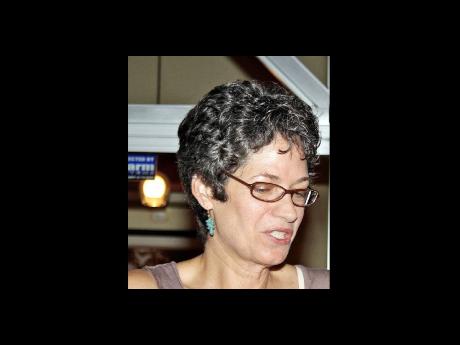McCaulay's 'Dog-Heart' shines through inherent pitfalls
Dog-Heart
Author: Diana McCaulay
Publisher: Peepal Tree Press
Reviewer: Mel Cooke
The subject matter of Diana McCaulay's Dog-Heart is overly familiar in the fiction of novels, the flow of verse, and the read-and-toss of newsprint. In her debut novel, McCaulay addresses the Jamaican social divide, which is especially striking in the urban centres (in Dog-Heart it is middle-class Mona and the dirt-poor Jacob's Pen). her kind-hearted Sahara Lawrence helps not only Raymond Morrison (who she encounters when he begs her in a parking lot and she hands him a 'Nanny'), but his entire family, giving them groceries and getting Raymond, his brother Marlon and sister Lissa into higher standard schools.
So far, so ho-hum. If that was the sum total of Dog-Heart, as an author, McCaulay could be the equivalent of what she is probably accused of being by truculent company executives who find themselves under the lens of the Jamaica Environment Trust, which she heads. A pie-in-the-sky, why-can't-we-all-just-get-along, tree-hugger.
However the entirely engaging Dog-Heart does not seek to summarise and solve Jamaica's social ills in its 248 pages. That it is a good book is beyond doubt. After all, in manuscript form, it won first prize in the National Literature Awards. But there can be a marked difference between a 'good' book and one which straddles popularity with the reader, who is not in a literature class and being structurally sound. Dog-Heart is both - easily clearing the inherent pitfalls of its accustomed topic and ostensibly do-gooder plot.
One of the contributing factors is the sub-themes which McCaulay explores. There is not only Sahara's own 'I never got to the things on my things to do before I die list' angst (which could have been one of the pitfalls), but the complications of her son Carl, who seems to be a spoilt kid tossing good opportunities away and taking his mother's love for granted. Tied into this is the return of his father, Lester, the late teenage love of Sahara's life that never lasted, and the combination of resentment and grudging appreciation she feels when the successful lawyer walks back into their son's life to a warm welcome from Carl.
Sexuality
Then there is the homosexuality between wayward ghetto youth, which McCaulay does not state explicitly but leads us close enough to the mango tree to smell the variety of the fruit, even if we do not see the tree. It is a serious, under-explored issue (consider that The STAR's main headline on Friday, June 11, was 'Used dildos found in Tivoli thug's house'). After Raymond participates in a blue movie-watching session with pals Lasco and Boston, McCaulay writes:
"Boston lean forward and say, 'Have to stop soon. Di old lady soon come.' Him not lookin at me, him a look at Lasco. I feel something bad going happen. Boston turn off the TV and turn on a small lamp. The light shine on him face from down underneath. Him face is all shadow and black skin. I scared a him now, even with him one hand. Lasco turn to me and say, 'Yout' man, mi stayin here awhile. You go back a Sovereign.'
"'G'waan,' Boston say, quiet-quiet. I stand up and leave them on the couch."
Then there is the disdain and outright abuse Raymond and Marlon suffer when they are transferred to Holborn Prep from the nightmare of Nightingale All-Age, the brothers nicknamed 'Big Foot' and 'Baby Big Foot' respectively. Worse than that, though, is Raymond's encounter with schoolmate Anastasia Gilbert, who leads him on into talking about watching the triple X-rated stuff and then complains to the school authorities. It does not help when his sole pal, Felix, explains that, "she get bad marks and she don't want her mother to punish her for it, so she tell a story about you and her marks don't matter so much."
There are other elements of Dog-Heart which make for an interesting read, through Raymond's explosive exit from Holborn, the tragedy of a police shooting at the Jacob's Pen home, the twist of a gang initiation turned redemption opportunity.
Through it all, McCaulay's detailed narrative puts flesh on the tale, giving the reader much to chew on - though the truths it tells about Jamaica may be, for some, hard to swallow.
'Dog-Heart'
shines through inherent pitfalls


